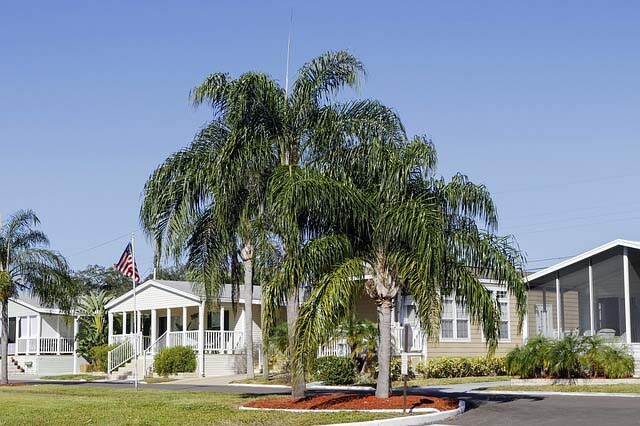Mobile Home Park investing has helped billionaire Sam Zell become a commercial real estate investing legend. In this blog, we explore why that is, and how to know if it’s right for you.
With a self-made net worth estimated at over $5.5 billion, built by real estate, Zell is no stranger to choosing profitable commercial real estate investments.
Zell began his career with residential property management, then moved into multifamily, and finally settled into the mobile home park niche.
So, why does Zell guide his Chicago-based Equity Group Investments (EGI) towards majority holdings in the mobile home park industry?
A few good reasons:
- High cash flow
- Tax benefits
- Recession resilience
- Operational flexibility
Cash Flow
Traditionally, Mobile Home Parks have some of the highest cap rates (7-12% National Average) across all of the asset classes. Only a few select niches such as self-storage (8.5-9%) and assisted-living facilities (7-10%) can compete, in contrast to the more popular apartment building (5.6%).
This higher cap rate provides a few major benefits:
- Major cash flow
- Cushion for debt servicing caused by high cash flow
For many owners, higher cash flow alone is enough to combat the fears of mobile home park investing, and they trust Zell’s expertise. However, if you’re still not sold, continue reading.
Tax Benefits
In addition to high cash flow, mobile home parks also offer attractive tax benefits.
Mobile home parks benefit from accelerated depreciation schedules when compared to other asset classes. Most commercial real estate owners enjoy the fact that multifamily buildings can be depreciated on a 27.5-year schedule when compared to commercial’s 39-year schedule. However, many don’t know that many elements of mobile home parks can be depreciated on a 15 -year schedule.
This is because, unlike multifamily and commercial, a majority of mobile home park value comes from land improvements. These land improvements include things such as roads, utility infrastructure,
Recession Resilience
Zell’s portfolio has proven to be capable of not only surviving recessions but thriving during them as seen again and again in EGI’s 31 years of experience.
Part of this resilience may be attributed to EGI’s large stake in mobile home parks.
Mobile home parks benefit from a process similar to Trickle Down Theory. The idea is that during tough economic times, people may downgrade their homes. For instance, a person in a $1MM home goes to a $500k one, or a person in a $500k home goes to a $250k one, and so on.
Because of this process, mobile home parks create a solution for consumers looking to find affordable housing during tough economic times. Mobile homes provide those consumers with the opportunity to have access to affordable housing, and possibly even the privilege of homeownership above all.
As we’ve seen in recent times, even during bullish markets, consumers are in a constant search for affordable housing. This may even contribute lower occupancy volatility during a variety of market climates down the road.
Operational Flexibility
Of the many benefits to mobile home park investing, one of the most prominent is operational flexibility. Mobile home parks provide a unique array of revenue streams.
With most multifamily projects, a majority of the operating income comes from the tenant rental income. However, mobile home parks’ income can come from a variety of sources.
Income Sources for Mobile Home Parks
- Rent
- Lot rent
- Financing payments (achieved when selling homes to the tenants)
- Master leases
- Additional storage and garage leases
- In some cases, even billboard ground rent
Like Zell, many owners use this array of options to their advantage. Being flexible with factors such as the traditional rent and lot rent allows owners to tailor the property to work for their personal needs, rather than against them. For example, let’s say an owner needs steady cash
Benefits of Seller Financing Contracts
When doing this, you:
- Lower tenant turnover rates
- Tenants are less likely to move out if they own their homes.
- Mobile home parks typically incur less than 20% of the annual tenant turnover that an apartment complex experiences.
- Reduce your management responsibilities
- You are also no longer responsible for the interior capital expenditure liabilities (broken toilets).
- More predictable financials
- The tenant-owned-homes (with their lower risk of vacancies, lower CapEx liability, and steady financing income) create a more predictable outlook of both cash incoming and outgoing.
The next feasible question to ask oneself is: if Mobile Home Park investing is so profitable, why doesn’t everyone do it?
Although mobile home parks are capable of achieving high returns, while simultaneously maintaining low vacancy and management liabilities – most do not.
However, the issues do not surface because of the asset. Instead, because of the management techniques.
Most mobile home parks are operated by old school owners. These owners tend to keep poor financial management records (which make resale difficult) and operate in a less efficient manner.
This doesn’t mean that these mobile home park owners are unsophisticated, instead, they are simply out of date with the modern day operational flexibility of these assets.
In the modern day world, mobile home park owners can achieve remarkable returns when they:
- Take advantage of operational flexibility techniques
- Install modern management strategies
Operational flexibility techniques such as the ability to collect income from owner financed homes, adjust lot rent to market rate, and storage all have the potential to increase income, while simultaneously lowering expenses through organized management that take financial liabilities off of the owner’s plate.
However, one of the most important factors in the performance is the management style. Management styles have changed over the years. The management evolution began with first, the traditional self-managing owner who managed the operation on their own. Then the professional property manager emerged where manual processes were put into place to gain efficiency. And most recently, the resourceful software-based management style, where software is used to automate manual processes and help alert and identify when something does not seem right.
How does Zell operate for maximum performance?
Zell has been able to achieve consistent success by operating his portfolios in a
While most mobile home park owners spend their energy and time trying to keep track of daily moving parts associated with operating the asset, Zell allocates his efforts more efficiently. He does this by outsourcing the daily operational and performance management. Outsourcing allows Zell to spend his time focusing on developing and honing his strategies, rather than tracking all of the data himself.
With a team of analysts, accountants, and managers, Zell is able to read the summary data from his investments regularly.
Luckily, we have a solution for you
Real estate-specific analytics software lets you manage your portfolio from the same bird’s eye view, at a fraction of the cost.
Although an analytical point of view is crucial, large teams of analysts, accountants, and managers are expensive.
In conclusion, in today’s modern-day world, the solution is technology. Take advantage of STRATAFOLIO’s innovative software, and operate your portfolio like a modern-day Zell.
Learn more about how our real estate analytics software can help you become the next Zell. Schedule a demo today!








